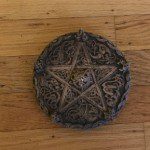Upon entering the Craft, it is traditional, almost required, that one choose a new name. This practice has ancient roots, yet also serves a number of sound purposes. Some groups ask the individual to meditate on it and choose their own name; in others the leaders or elders, after similar meditation, assign one. In the modern Craft, with its increased openness and greater likelihood that the newcomer will be acquainted with Witches outside their own coven or study group, people often choose an informal “nom de Craft” to use in the Community prior to their initiation and adoption of a true magical name.

Formal initiation into a coven is a symbolic death and rebirth, as is, when one analyzes the ritual, Christian baptism. Until Augustine declared that infants were born sinful through both the sin of Adam and their parents’ sin in begetting them, baptism was practiced exclusively by adults who were converting from Pagan faiths. It was the practice to choose a “Christian” name, generally one from the Bible, to symbolize this conversion and by which the convert would be known among other Christians. Over the centuries baptism and christening — the bestowal of a name — separated into two rites, but the individual name is still, in most of Europe and the Americas, properly called a christian name.
It was common in ancient Rome for a child’s name to refer to the birth order: Primus, Quintus, Sextus, Septimus and of course Octavius (First, Fifth, Sixth, Seventh and Eighth) are all names familiar from history. Surnames, literally “afternames” were added as a person’s accomplishments earned them or if they came from a prominent family. Women, alas, didn’t rate names of their own but were given a feminine variant of their father’s name.
In tribal cultures the world over, the names mothers give their babies are not expected to follow that child all its life. Baby names are permitted, sometimes, to be quite sentimental and cute. They often symbolize the kind of child the parents want this one to be — obedient, helpful, etc. Or they can derive from the child’s appearance. Some cultures do not name babies at all, but wait until the children begin to develop personalities that suggest names. When the child reaches puberty and is initiated into adult society, they take or are given their adult name. Even then, the name may change as the person changes. The only equivalent in Western culture is the adoption of the husband’s surname by married women, and that is no longer a given.
In each of these instances, the taking of a new name symbolizes the death of the old personality and rebirth of the person. So with the Craft name. In one version of the Wiccan initiation the postulant, when challenged to give their name, replies, “I am but newly born, and have no name.” Nameless they are permitted into the Circle, where they are reborn as a child of the Goddess and sibling of other Witches, and named as such.
What Should You Choose?
When a person decides to become someone new, they have high aspirations for that new self. The choice of a magical name must reflect these ideals, not only in the Craft but in all magical and spiritual paths. Violet Firth is known as Dion Fortune, for instance, which meant “God, not Fortune/Luck.” Israel Regardie, another pseudonym, means “He Who Beholds the Kingdom of God.”
A feature worth noting in all these names is the thought and imagination which goes into them. If your personal totem is the cow, for instance, it is all too easy to call yourself “Cow Woman” or “Elsie.” It takes a little more work and imagination, and therefore puts more energy into it, to research “cow” words and choose one of them for your name: kie, aurochs or tauros, or the name of one of the cattle Goddesses such as Hathor or Boann. Often the more obscure the word, the more effective as a magical name.
It is well to bear in mind that all names, and all things which have names, exist both in the material world and on other planes. One of the reasons for choosing a name might be so that we can have access to the energy of a powerful archetype. Many new Witches therefore choose deity names, and we have veritable groves of “Lady Isises” and “Lord Pans.” Although I did the same, I now consider it unwise and have chosen a new “inner” name. Putting a name to magical use, identifying yourself with it and by it as you go out on the planes, opens you to everything associated with that name, the negative as well as positive. Sometimes the experience can be downright unpleasant, if not hazardous.
It’s all very well to feel that Lucifer was a Pagan God first, and a wholly positive one, but the fact is that for 2,000 years the Christians, who outnumber us, have been putting energy into a really nasty archetype under that name. There is no way that you can reclaim that name for yourself without being saddled with that entire 2,000 years worth of vileness. Or, if your chosen pantheon is Norse and your favorite element is fire, consider what else besides fire you’d be getting if you named yourself Loki: lying, thievery, treachery, murder. Logi is a good fire name, as is Musspell, and they have the added advantage of not being so very common. Or suppose you, as “Lady Isis,” go out on the astral and met that Lady in person. Do you think She would be pleased? Or, would She be more likely to react with, “Then who the hell does that make Me?” ZAP!
A purely practical reason for assuming a new name on entering the Craft is that of protection. The laws of the older traditions are quite specific in forbidding Witches to know each other’s given “true” names lest we be forced through torture to implicate each other. The threat of torture is less worrisome today, but we have concerns of our own: will our boss find reasons not to need us if he knows? Will our ex-spouse demand custody, claiming that our religion makes us an unfit parent? Will our neighbors forbid their children to play with ours? Will they shoot at us or vandalize our house? Will we be viewed as sane, sensible people? All too often, the answer is Yes they will, and No we won’t.
It can be safest simply to have two identities, that of the business world (and sometimes, sadly, our family), and that of Wicca. Using an adopted name for all our Craft contacts helps keep these identities separate. It is also helpful, if we begin writing or speaking on Wiccan topics, in keeping argumentative idiots (or only slightly less annoying, wannabes) off the doorstep.
It is also true that having a secret name for our inmost and truest self is good protection against magical attack or manipulation. If the name by which you are known on the inner planes is (for instance) Isadora of Silverwood, but the person who wishes you ill knows you only as Janet Jones, they are going to have a much harder time reaching you magically, since magic can only happen out on the planes. Many experienced Witches keep that “nom de Craft” and have still a third name known only to their Coveners and the Gods. Paranoid? Maybe. But, that’s why there’s an insurance industry.
So what should the fledgling Witch call herself? Traditional Craft names include names of flowers or herbs, stars and constellations, heroes or heroines, deities and their totem animals. Some people adopt the names of well-known Witches from the old trial records, such as Isabel (Goudy) or Jeanne (d’Arc) or even Giles (d’Rais), or of mythic figures such as Cuchullain or Gawain. In much the same spirit, Catholic postulants take the names of their “Mighty Dead”, the saints. The choice is up to the new Witch and their coven.
It is far easier to say the kinds of names not to choose. Many of the names being chosen by newcomers to the Craft are inspired by names from the New Age movement, since New Age groups are often far more public than the Craft, and it is, therefore, often a young person’s first introduction to alternative spirituality. They, too, use spiritual or magical names, often with a Native American flavor. Unfortunately, most of the names we hear from among them had all the juice squeezed out of them — by Witches – years and years ago. By now they are unbelievably banal.
We have flocks of Ravens (which used to be a powerful, evocative Craft name), rafts of Rainbows, packs of Wolf-folk, enough Feathers to stuff every mattress at the Hilton, Moon-this and Sunshine-that and Crystal-something-else, and not an original thought or bit of effort in the bunch. Worse yet, people are combining two or three of these by-now-meaningless clichés to form names which, far from expressing lofty ideals, elicit snickers.
Don’t do this to yourself. You only get out of the Craft what you put into it, and that truth is nowhere truer than in your choice of a Craft name.
The Craft is more than a matter of “feeling spiritual”, of having good intentions and sweet sentiments. It is imaginative, creative. It demands that we think, that we examine our beliefs and our thoughts about those beliefs. It can be playful, powerful, beautiful, frightening, ascend to the heights and plumb the deeps. Use these things. Use both your imagination and your intellect to search out a name that is uniquely you: your badge, your shield and your beacon into the unknown.

Patheos Pagan on Facebook.

the Agora on Facebook
The Rantin’ Raven is published on alternate Saturdays here on the Agora. Subscribe via RSS or e-mail!
Please use the links to the right to keep on top of activities here on the Agora as well as across the entire Patheos Pagan channel.

















